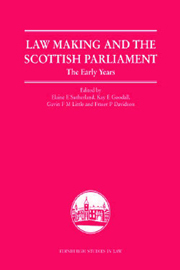Book contents
- Frontmatter
- Contents
- Preface
- List of Contributors
- Table of Cases
- Table of Westminster Statutes
- Table of Scottish Parliament Statutes
- Table of Westminster Statutory Instruments
- Table of Scottish Statutory Instruments
- THE SCOTTISH PARLIAMENT – ITS GENESIS AND OPERATION
- RIGHTS AND SOCIETY
- PUBLIC ADMINISTRATION AND SERVICES
- JUSTICE AND LEGAL SYSTEM
- ECONOMY AND ENVIRONMENT
- 14 Property Law: How the World Changed at Martinmas
- 15 Business
- 16 Environment and Sustainable Development
- 17 Transport
- Index
15 - Business
from ECONOMY AND ENVIRONMENT
Published online by Cambridge University Press: 05 September 2013
- Frontmatter
- Contents
- Preface
- List of Contributors
- Table of Cases
- Table of Westminster Statutes
- Table of Scottish Parliament Statutes
- Table of Westminster Statutory Instruments
- Table of Scottish Statutory Instruments
- THE SCOTTISH PARLIAMENT – ITS GENESIS AND OPERATION
- RIGHTS AND SOCIETY
- PUBLIC ADMINISTRATION AND SERVICES
- JUSTICE AND LEGAL SYSTEM
- ECONOMY AND ENVIRONMENT
- 14 Property Law: How the World Changed at Martinmas
- 15 Business
- 16 Environment and Sustainable Development
- 17 Transport
- Index
Summary
INTRODUCTION
In March 1999, the same year that the Scottish Parliament was re-established, the then Scottish Office commissioned a report entitled Pathfinders to the Parliament: A Business Agenda for the Scottish Parliament. The report was divided on the basis of key sectors of the Scottish economy and each of the groups was convened by key business individuals operating within those sectors. Each group made suggestions for policy and legislative initiatives. The majority of the issues raised could be classified as policy issues which fell within the remit of the then Scottish Executive. Others entailed legislative proposals:
There is also a strong view that the Scottish Parliament should not put Scottish business at a disadvantage by adopting financial or regulatory policies which put additional burdens on Scottish business and make them less competitive in the global market … the Drinks and Hospitality Pathfinder Group recommends the modernisation of Scottish licensing laws to bring them into line with European neighbours and also to meet the expectations of both domestic consumers and visitors to Scotland.
Remarkably, since 1999, there have been very few Acts of the Scottish Parliament (“ASPs”) introducing reforms to the law of Scotland which can be categorised as falling squarely within the compass of business law or commercial law. The opportunities for reform may, in part, have been constrained by the terms of the Scotland Act 1998 which limit the powers of the Scottish Parliament in relation to business law or commercial law, but equally the distinct lack of business law reform is not for want of suggestions from the Scottish Law Commission.
- Type
- Chapter
- Information
- Law Making and the Scottish ParliamentThe Early Years, pp. 303 - 316Publisher: Edinburgh University PressPrint publication year: 2011



